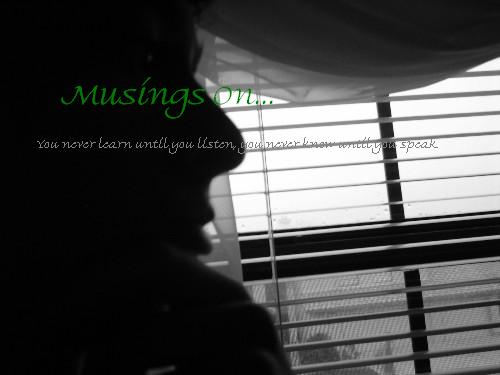What is the importance of music? Why is it that a series of sounds travelling at different wavelengths can tell a story? This leads to another interesting question that I will post at a later date. In a literal sense, music is nothing more than variations on the frequency of wavelengths. How is it that variations in vibrations are able to tell stories so intricate and beautiful?
I believe that the answer lies in how we perceive these variations. Certain pitch variations may seem more pleasant to an individual because of the association with a pleasant memory from one's childhood. For example, my mother would always call upstairs that dinner was ready. In her phrase, "Dinner's ready," the word dinner was on the 3rd note of the scale, followed by the tonic, or 1st note of the scale. Because of this, I enjoy hearing the interval of the third (in most cases, that is) spoken or sung.
It would, of course, be different for all individuals, or it may also be that they do not have pleasant associations with music or certain aspects of music. Yet another question concerning music is raised by this, of which I will discuss at a later date.
Music is also one of the only truly universal languages. Of course, one might say that music is not a universal language because the lyrics might be in French, or German, or Russian; three unrelated languages. The problem is that classical music is enjoyed around the world by all sorts of people. Classical music does not have lyrics. Similarly, most jazz, new age, and film music lacks lyrics as well. Yet these are also enjoyed in most parts of the world. One might say that music touches our soul. I think that this cliche is true. Music appeals to the brain and to the human person because of the emotion that it embodies. Very few human creations are as emotionally charged as music is.
Friday, September 7, 2007
Subscribe to:
Post Comments (Atom)

3 comments:
First comment, ever. Good post, sir. I dig it. Especially the last bit. The cliche of cliches is that they had to come from somewhere - usually the truth.
You already know how much I love music. I think as a family, my house borders on obsession with it. But this isn't a bad thing as far as I can tell - because just about all of our experiences thereof are pleasant. It has helped me personally through some very difficult times in my life and I have found it to be very true that, many times - music captures or touches emotions that cannot be satiated by mere verbalization.
Music is the embodiment of emotion itself. Unless music falls on deaf ears, it will evoke emotion of some sort. My only goal in life is to harness the power of music through composition. That power allows the weilder to control orchestra's, utilize the talents of the world's renowned musicians, and captivate the hearts of millions. There is so much more interpretaion allowed in music, yet sometimes the purpose of the piece is clear to all. What I mean is no two humans in the world will draw the same emotions from a piece, yet the main point of the piece will come across quite clearly. My final thoughts on the subject is music is the most powerful form of communication. So powerful, it is as if sometimes the very voice of God Himself is speaking to you, possesing the composer with his divine power. Music speaks louder than any words ever can. And I'm not the only one who feels this way...
"Music is jaust a means of crating a magical state" -Robert Fripp
"I don't want audiences to feel a specific thing, I just want them to feel" -Paul Simon
Interestingly enough, while living in the country of Yemen, the Yemenite Jews were prohibited from using instruments to make music.
They skirted that prohibition by banging on garbage cans which gives merit to the idea that humans deeply need to "make" music.
Post a Comment